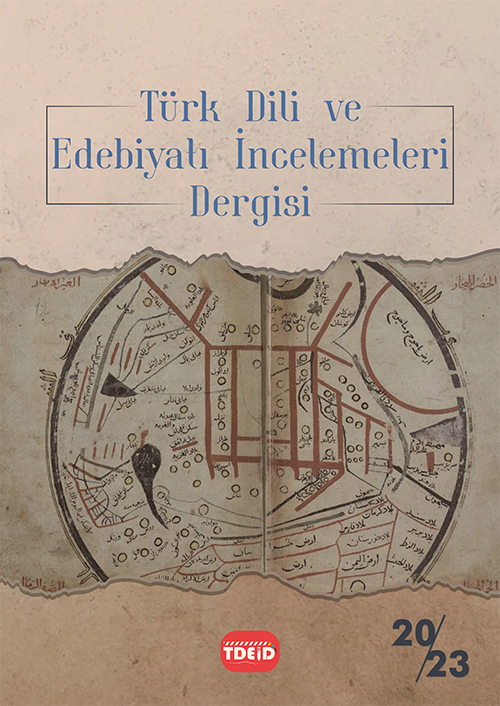On the Origin of the Reduplications in Şeyhoğlu Mustafa's Marzubān-nāme and Kul Mesud's Kalila and Dimne
DOI:
https://doi.org/10.5281/zenodo.14651309Keywords:
Reduplications, etymology, Old Anatolian TurkishAbstract
Turkish is a language that is rich in both spoken and written language in terms of various word patterns. One of these word patterns is reduplication. Reduplications, which have been used since the earliest periods of Turkish, have interacted with different languages over time and brought many new words to our language. It is known that some of the words that make up reduplications in Old Anatolian Turkish and today's Turkish have different origins. This situation can be explained by the fact that Turkish interacted with different languages in its historical periods and the Old Anatolian Turkish Period. In this study, the reduplications in Şeyhoğlu Mustafa's Marzubân-nâme and Kul Mes'ud's Kelile ve Dimne Tercümesi were determined and then the language from which the words making up the reduplication were borrowed was investigated. The obtained data were classified under nine headings. As a result of the classification, it was determined that reduplications consisting of words of Turkish origin were the majority in both works. This study aims to examine the origins of the reduplications in the works of Şeyhoğlu Mustafa's Marzubân-nâme and Kul Mes'ud's Kelile ve Dimne Translation, which are similar works from the Old Anatolian Turkish Period.
References
Ağakay, Mehmet Ali, (1953), İkizlemeler Üzerine I, Türk Dili Dergisi, Sayı: II, (16), s. 189-191.
Ağakay, Mehmet Ali, (1953), İkizlemeler Üzerine II, Türk Dili Dergisi, Sayı: II, (17), s. 268-271.
Ağakay, Mehmet Ali, (1954), Türkçede Kelime Koşmaları, Türk Dili Araştırmaları Yıllığı, Belleten, s. 97-104.
Ağca, Mustafa, (2017), Türkçede Bir Söz Üretim Yöntemi ve Gramatikal İşaretleyici Olarak Yineleme, Türk Bilig, Sayı:34, s. 89-104.
Ağakay, Mehmet Ali, (1954), Türkçede Kelime Koşmaları, Türk Dili Araştırmaları Yıllığı, Belleten, s. 97-104.
Çürük, Yasemin, (2016), İkilemelerin Kapsamı, Akademik Sosyal Araştırmalar Dergisi, Sayı:29, s. 426-430.
Çürük, Yasemin, (2018), Sözcük Türetme Yöntemi Olarak İkileme, International Journal of Languages Education and Teaching, Volume:6, Issue:3, s. 499-503.
Gülensoy, Tuncer (2011), Türkiye Türkçesindeki Türkçe Sözcüklerin Köken Bilgisi Sözlüğü, Cilt I-II, Türk Dil Kurumu Yayınları, Ankara.
Hatiboğlu, Vecihe, (1981) Türk Dilinde İkileme, Ankara Üniversitesi Basımevi, Ankara.
Karaman, Ahmet (2021), Eski Türkçede (VIII.-XII. Yüzyıl) İkilemeler, Doktora Tezi, İnönü Üniversitesi, Malatya.
Korkmaz, Zeynep (1992), Gramer Terimleri Sözlüğü, Türk Dil Kurumu Yayınları, Ankara.
Korkmaz, Zeynep, (2017), Marzûbân Bin Rüstem-Marzubân-nâme Tercümesi Destûr-ı Şâhî, Türk Dil Kurumu Yayınları, Ankara.
Özkan, Mustafa, (2021), Türk Dilinin Gelişme Alanları ve Eski Anadolu Türkçesi, Filiz Kitabevi, İstanbul.
Özmen, Mehmet (2016), Türkçenin Söz Dizimi, Karahan Kitabevi, Adana.
Şahin, Hatice, (1997), Ferahnâme’de Geçen İkilemeler Üzerine Osmanlı Araştırmaları XVII, İstanbul, s. 125-135.
Toska, Zehra, (1989), Türk Edebiyatında Kelile ve Dimne Çevirileri ve Kul Mes’ud Çevirisi, İstanbul Üniversitesi, Doktora Tezi, Cilt: I-II, İstanbul.
Türk, Osman, (2020), Hamza-nāme’nin 72. Cildinde Kullanılan İkilemeler, RumeliDE Dil ve Edebiyat Araştırmaları Dergisi, (Ö7), s. 357-366.
Türkçe Sözlük, (2019), Türk Dil Kurumu Yayınları, Ankara.
Vardar, Berke (2007) Açıklamalı Dilbilim Terimleri Sözlüğü, Muntligal Yabancı Dil Yayınları, İstanbul.
Downloads
Published
How to Cite
Issue
Section
License
Copyright (c) 2024 Türk Dili ve Edebiyatı İncelemeleri Dergisi

This work is licensed under a Creative Commons Attribution 4.0 International License.







